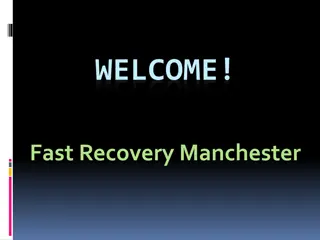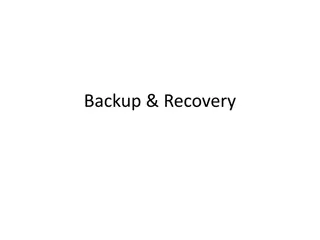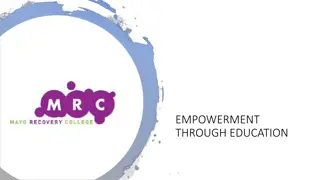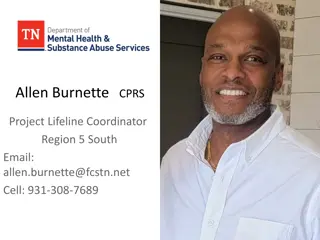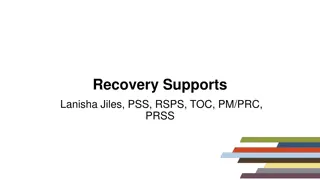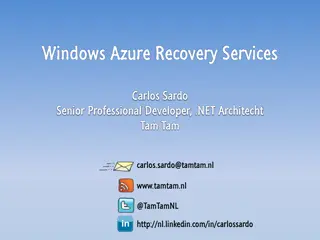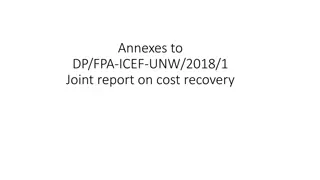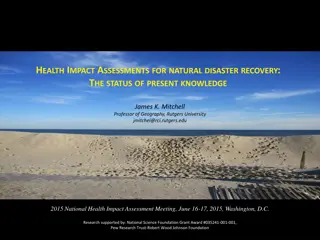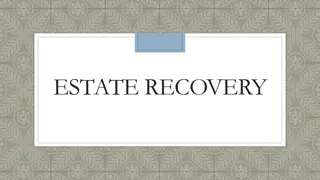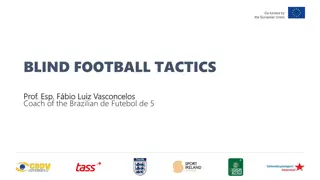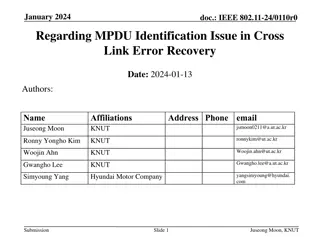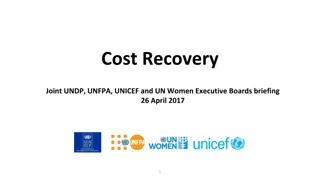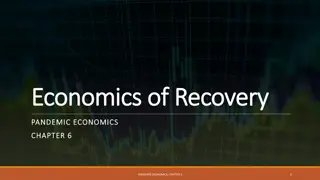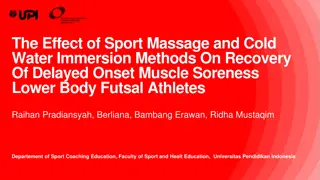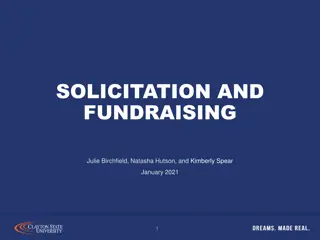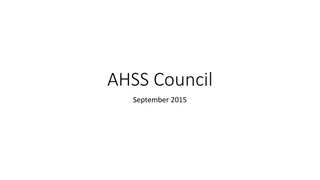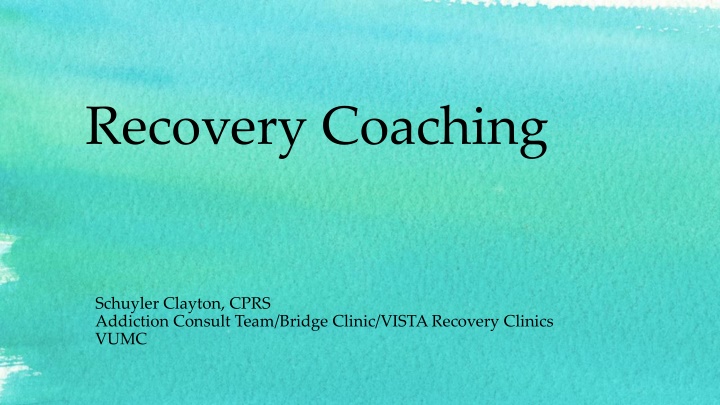
Recovery Coaching and CPRS Qualifications
Explore the role of Recovery Coaching in addiction treatment, the qualifications needed to become a Certified Peer Recovery Specialist (CPRS), and the ethical standards that guide peer support in the field. Recovery Coaches assist individuals in achieving long-term recovery from substance use disorders and mental health challenges, promoting health, self-directed living, and personal growth. CPRS training in Tennessee includes topics like communication, motivational interviewing, and wellness, ensuring peer specialists are equipped to provide effective support.
Download Presentation

Please find below an Image/Link to download the presentation.
The content on the website is provided AS IS for your information and personal use only. It may not be sold, licensed, or shared on other websites without obtaining consent from the author. If you encounter any issues during the download, it is possible that the publisher has removed the file from their server.
You are allowed to download the files provided on this website for personal or commercial use, subject to the condition that they are used lawfully. All files are the property of their respective owners.
The content on the website is provided AS IS for your information and personal use only. It may not be sold, licensed, or shared on other websites without obtaining consent from the author.
E N D
Presentation Transcript
Recovery Coaching Schuyler Clayton, CPRS Addiction Consult Team/Bridge Clinic/VISTA Recovery Clinics VUMC
Objectives Define Recovery Coaching as an emerging profession and therapeutic approach. Review the recovery coaching role across levels of care for addiction. Describe the current evidence for recovery coaching interventions improving SUD outcomes.
What is a Recovery Coach? Peer support role Previously defined by SAMHSA as a peer-helping- peer service alliance in which a peer leader in stable recovery provides social support services to a peer who is seeking help in establishing or maintaining their recovery. Person with first- hand experience with Substance Use Disorder and/or mental illness and involved in long term recovery Help patients define, achieve, and sustain recovery
What is recovery? A process of change through which individuals improve their health and wellness, live a self-directed life, and strive to reach their full potential. The Substance Abuse and Mental Health Services Administration (SAMHSA)
Recovery Coaching as an Emerging Profession Stemming from Patient Navigators , RC s play an important role in linking patients to care. Recovery Coaches can be utilized in recovery community centers, hospitals, treatment centers, outpatient clinical settings, and anywhere there is a need for peer support for patients in recovery from addiction or mental illness. Many states have formalized trainings for certification in peer specialist services. RC s can be instrumental in assisting a patient in navigating complex medical systems.
CPRS Qualifications Certified Peer Recovery Specialists (CPRS) is a free training in TN for peer specialists. 40 hours training including role playing, feedback, group work, self-examination, and tests. Topics include communication, problem-solving, motivational interviewing, wellness, opioid use disorder, and ethics. Must be 18 or older Hold a high school diploma or GED Self identify as a person who is in recovery from mental illness, substance abuse, or co-occurring disorder Have demonstrated self directed recovery for a minimum of 24 consecutive months Applications can be found on www.tn.gov
CPRS Code of Ethics 1. The primary responsibility of CPRS is to help peers achieve their own needs, wants, and goals. 3. CPRS will conduct themselves in a manner that fosters their own recovery. 4. CPRS will openly share with peers, other CPRS s, and non peers their recovery stories from mental illness, substance abuse, or co-occurring disorders as appropriate for the situation in order to promote recovery and resiliency. 8. CPRS will promote self-direction and decision making for those they serve. 9. CPRS will respect the privacy and confidentiality of those they serve. 10. CPRS will promote and support services that foster full integration of individuals into the communities of their choice.
CPRS Code of Ethics 11. CPRS will be directed by the knowledge that all individuals have the right to live and function in the least restrictive and least intrusive environment. 12. CPRS will not enter into dual relationships or commitments that conflict with the interests of those they service. 14. CPRS will not use illegal substances, misuse alcohol, or other drugs. 15. CPRS will keep current with emerging knowledge relevant to recovery and will share this knowledge with other CPRS s. 17. CPRS will not provide services, either for employment or on a volunteer basis, without supervision. 18. CPRS will not provide services beyond their qualifications. This includes diagnosing an illness, prescribing medications, and providing clinical services. 19. CPRS shall only provide services and support within the hours, days, and locations that are authorized by the TDMHSAS-approved agency with which they work.
Whats it like to be a person in recovery?
Recovery Coach Role at VUMC Inpatient VUH Bridge Clinic * Consult with Primary Team to help determine patents treatment plan to help minimize length of stay and reduce readmission rates * Provides temporary treatment (up to 3 months) including MAT services, Social Work and Case Management support and Recovery Coaching. * Provide bedside support to patients with SUD/Mental Health Disorder * RC provides peer support, relapse prevention planning/processing, coping skills, referrals to community recovery support programs, and is a link to remaining in care. * RC can use personal experience to build rapport and mentor patients through their medical course
Outpatient Vanderbilt Recovery Clinics Provide long term care for patients graduating from Bridge Clinic as well as insured/self pay patients Participation alongside Recovery Coach in group therapy facilitated by clinical social workers More one on one time with RC s outside clinic hours Assist patients in building independence in their recovery
Recovery Coaching in Outpatient Setting * check in with recovery progress in the way of achieving recovery * help patient overcome any barriers that may get * further provide coping skills * help patient utilize a relapse prevention plan personalized recovery goals * help patient further meet their overall *connect patient with community resources
* Patients contemplating recovery have unique challenges in medical setting Recovery Coaching in a Medical Setting * Medical courses often complicate behavioral health care * Hospitalization can serve as an intervention and opportunity for providers to initiate treatment Their medical course can be a motivating factor for change towards wellness that RC s can help structure a relapse prevention plan Provides unique opportunity to assess risk vs reward of behavior change with someone with lived experience. Opportunity to provide harm reduction education
Patient makes contact with RC via inpatient admission at VUH or at intake at Bridge Clinic RC follows patient into Bridge Clinic to begin RC treatment planning RC is point of contact to link patient to care in outpatient setting/reducing rehospitalization Recovery Coaching at VUMC RC facilitates referrals to community resources RC works within interdisciplinary team model to address patient concerns along their episode of care RC mentoring helps build trusts between the patient and the medical team to encourage them to remain engaged in their long term care
- Advocate for patient while they are developing communication skills. - RC s provide insight to treatment team on what the patient is experiencing that may affect their engagement. - Assist patient in navigating their care as a person now living in recovery. - RC s can be a strong advocate for reducing stigma. The Patient Perspective - RC s provide validation for patients experience in early sobriety
Importance of Choice Participants emphasized the importance of having choices regarding their care, and not feeling coerced into accepting substance use treatment One participant explained, Regardless of the approach, providers need to recognize where the person is, give the person a choice, and provide the best care possible. *2016 Oregon Health and Science University, Qualitative Study of Hospitalized Patients with SUD
Uninsured Lack of support in the home May be experiencing homelessness Medical comorbidities complicating treatment Challenges patients may face, some of which in turn could affect their treatment Lacking access to mental health treatment and counseling May have legal issues Experience stigma which can affect patient engagement with treatment team Lack of employment opportunities
RCs have lived experience with navigating barriers to sustained recovery and can pass this on to patients RC s can be a source of motivation to maintain the course when tackling these challenges RC s can become advocates for patients struggling with legal issues or stigma Recovery Coaches help patient navigate these challenges RC s can assist patients in finding employment, housing options such as sober living, connect them with assistance for legal issues, counseling, financial assistance, ect. RC s can help facilitate patient moving through stages of change
Recovery Coach Handouts 12 step literature or meeting lists for area Relapse prevention worksheet Daily gratitude journal General tips/ coping skills Information for Al-Anon or other family support options Recovery Coach handouts serve to plant seeds of recovery that empower the patient to decide what works for them
Connecting to Community Supports RC s provide encouragement for patient to engage in long term support for their recovery and to establish multiple avenues of support Referrals to Residential Treatment, IOP, Outpatient care. MAT provider Provide Sober Living Resources Support Groups AA, NA, HA, SLAA, CA, EDA, etc. Celebrate Recovery (CR) Dharma Recovery SMART Recovery LifeRing, ect.
Recovery Coaching Studies A 2020 study by Kaileigh Byrne and associates concluded that patient engagement rate over a 6-month period post discharge from an inpatient setting was higher for participants receiving recovery coaching interventions compared to the stand of care control who did not receive RC interventions. A 2020 study by Satinsky presented further supporting evidence that implementing RC s in a treatment team is a sustainable and cost effective strategy for long term patient engagement. A 2019 study by David Eddie concluded that the peer specialists role displays great potential for improving patient outcomes while outlining the work needed to be done to establish the efficacy and effectiveness of RC s.
2020 Byrne Study 6 month prospective randomized controlled trial comparing outcomes between usual care and a physician-initiated RC intervention. Primary outcome measure was engagement in RC support services and secondary measure were substance use frequency as well as physical and mental health SF-12 survey. Conclusion: SUD is a chronic, relapse-prone disease, and the most important factor for predicting improvement at 5 years post-discharge is ongoing engagement. This study demonstrates that inpatient linkage to recovery coaching services improves engagement rates and can feasibly be implemented in a single large hospital system. This intervention is promising for both short-term and long-term engagement in recovery support services .
2020 Satinksy Study Study aimed at adapting and implementing recovery coach delivered behavioral activation interventions for problematic substance use among low-income, racial/ethnic minority populations receiving services in a community-based settings. Study used qualitative methods to solicit feedback for the target population, center staff, and recovery coaches. Clients expressed feeling more comfortable sharing their issues with RC. Found that recovery coach support linkage to care was crucial for many patients receiving support for meeting basic needs such as getting an ID, shelter, food, and clothing. RC s working in tandem with case management to link patients to resources increased meaningful engagement in SUD treatment.
Patient Testimonials from Satinsky study [Staff] used to help me [patient] a lot. She used to come to court with me. Everything. And [staff] helps me with getting into Access to Recovery and setting up appointments and all of that I need help because I can't read that good, but they help me with a lot of things. she's [recovery coach] like a teacher. Like somebody is trying to teach you [patients] but yet not forcing into you. But they've been there. And they know so they know all the tricks and con artists and all that they've been through it. They've done it. So to come here, you got to be straight up truthful. and here she [recovery coach] is, a year and a half, two years later, she's working for the recovery team That s a pretty inspirational story She used to sleep in the same clothes for seven days like I [patient] did It helps when you can relate to the person who's helping you and you know they've been through a little.
Concerns around Recovery Coaching Boundaries issues can develop as RC work typically lies at the intersection or purely-peer, and purely-clinical support roles. Need for clarity of the professional treatment realm with its clear roles, work schedules, and expectations, and marked differentiation between paid professional staff and clients, as well as the mutual-help 12 step tradition with its own well-articulated, and long-standing peer-support traditions. Importance of RC s communicating their scope of practice with their treatment team. Being mindful that alliance with client does not complicate engagement with clinical staff.
How Recovery Coaching works in a team approach? Communicate patient needs Provide patient perspective for better informed treatment Help fight stigma/advocacy for the patient Build trust between the patient and the medical provider Further education on Substance Use Disorder and treatments available Provide motivation for patient engagement in their treatment Identify resources that RC s have personal experience with Provide patients with deeper level of support than typically available in outpatient setting
Conclusion Many states have free training programs for peer recovery services such as the CPRS program in TN. Recovery Coaching in the hospital setting can help reduce recidivism and bridge patients to their next level of care. Recovery Coaching can improve patient engagement in the short and long term. Recovery Coaches provide unique insight into patient experience while working within an interdisciplinary team Recovery Coaches can link patients to community support programs and provide insight to patient on how these programs operate Recovery Coaches can be vital in assisting patients with basic needs that may lessen barriers to patient engagement Recovery Coaches provide support for patients outside regularly scheduled visits which improves engagement
The Importance of Recovery Coaching Going Forward Programs such as 12 steps provide a successful framework for the importance of peer- to-peer guidance in early recovery. This peer-to-peer model can be utilized for patients who are averse to established community recovery programs. Patients discharging from residential treatment and hospitals are at their most vulnerable time. RC s can help bridge this gap in treatment and help patients engage in aftercare. Where could recovery coaching be utilized: Legal system, hospital systems, outpatient addiction clinics, sober living, skilled nursing facilities, homeless missions, community centers, street outreach programs, EMS operations, school systems. The RC role within a traditional treatment framework is still being defined, but shows great promise in keeping clients engaged in care and improving patient outcomes. The scope of practice will become more clearly defined as the role is utilized in more levels of care.
Patient testimonials taken from: Patient experiences with a transitional, low-threshold clinic for the treatment of substance use disorder: A qualitative study of a bridge clinic Rachel L. Snowa, Rachel E. Simonb,c, Helen E. Jackd,e, Devin Ollerf, Laura Kehoeb,c, Sarah E. Wakema


